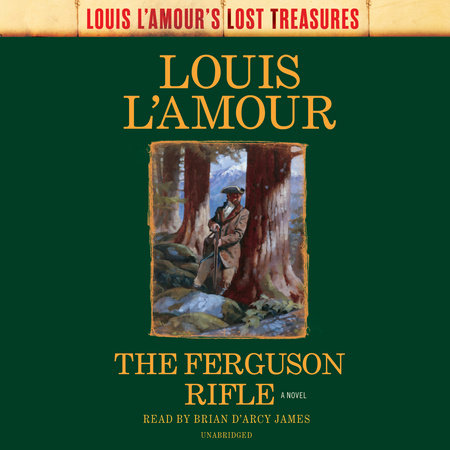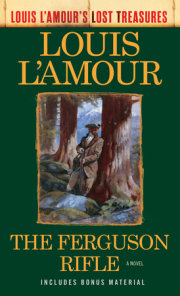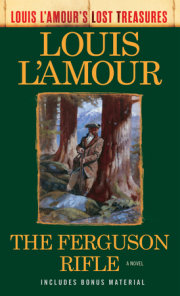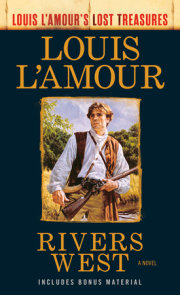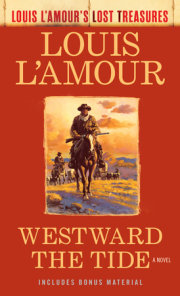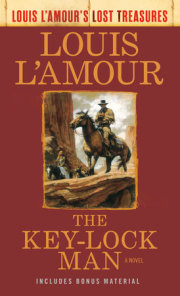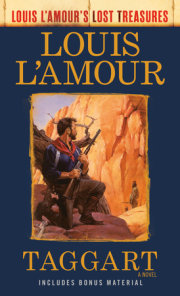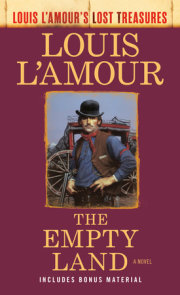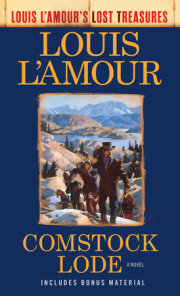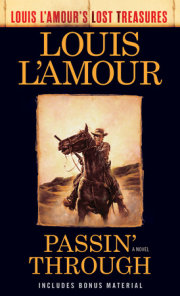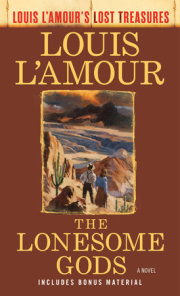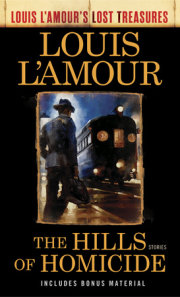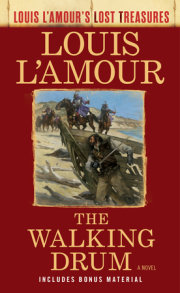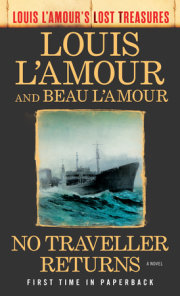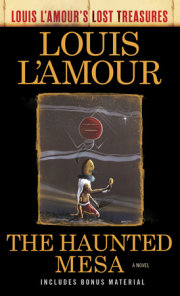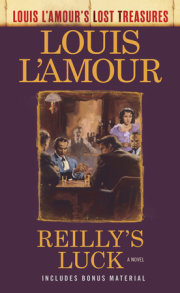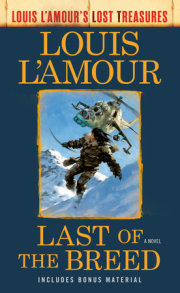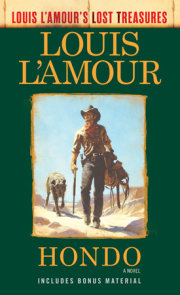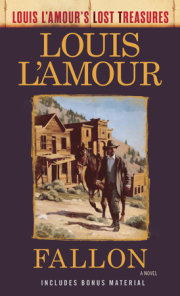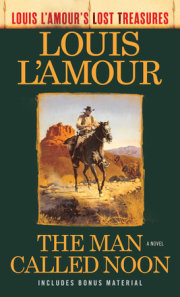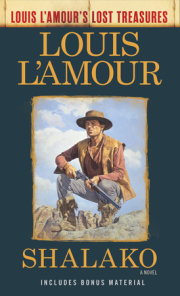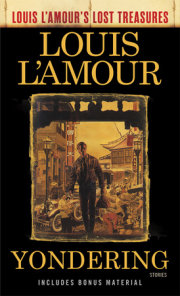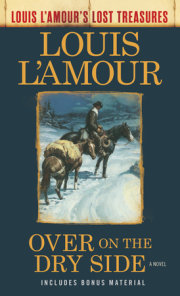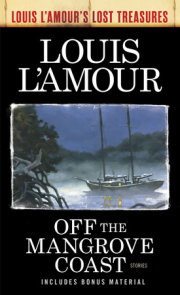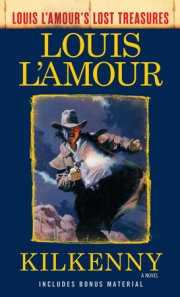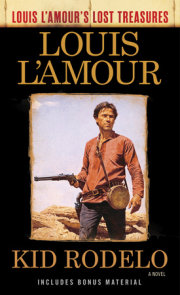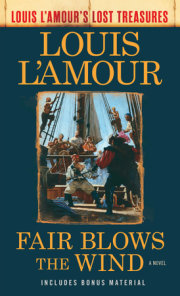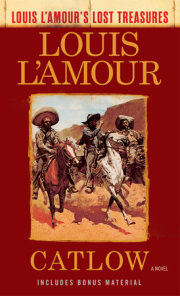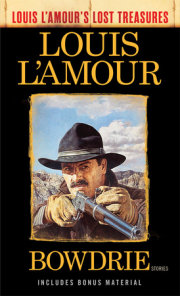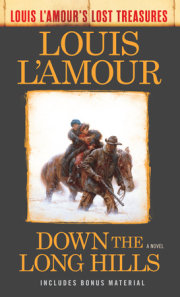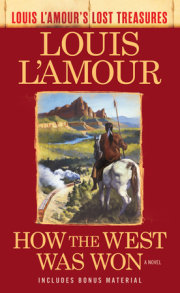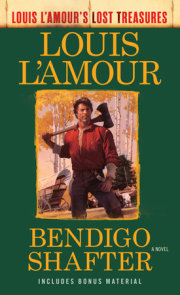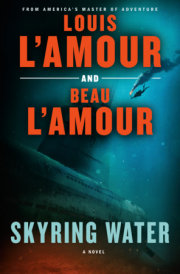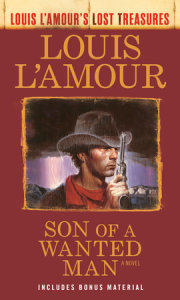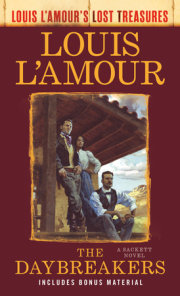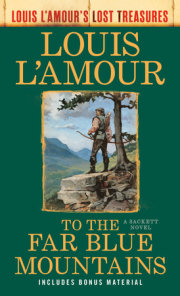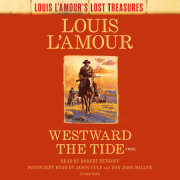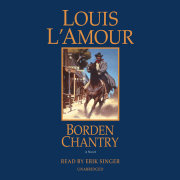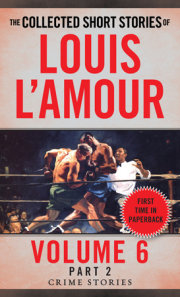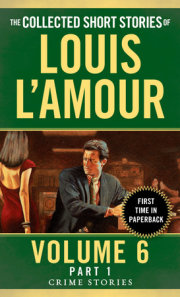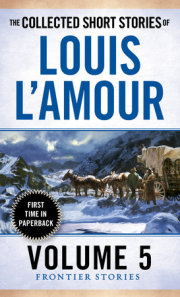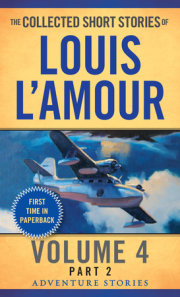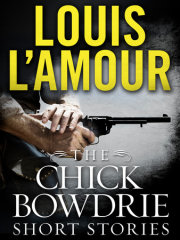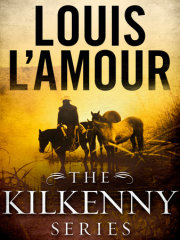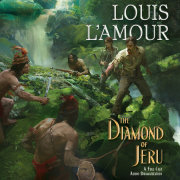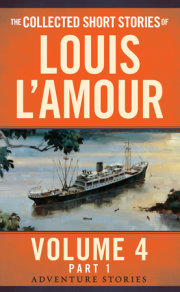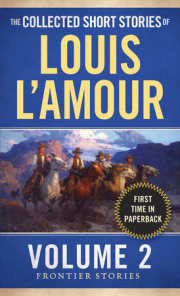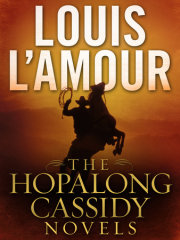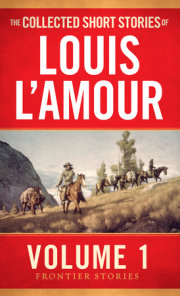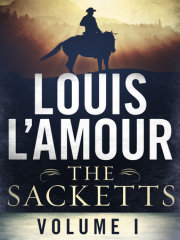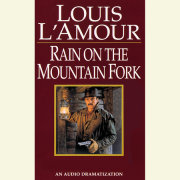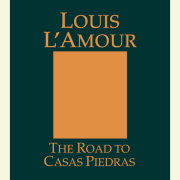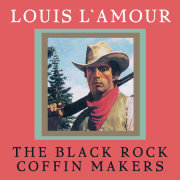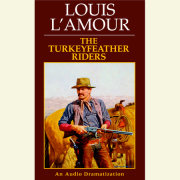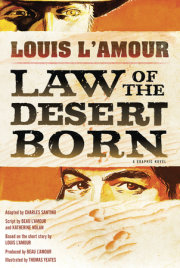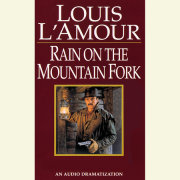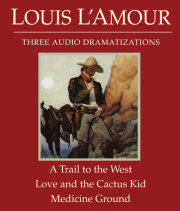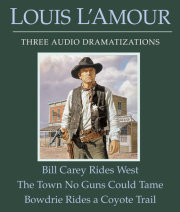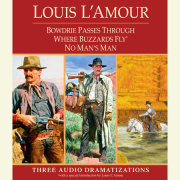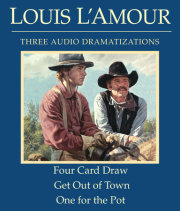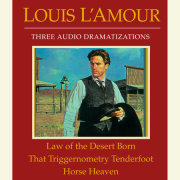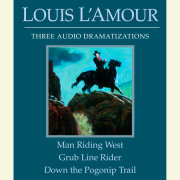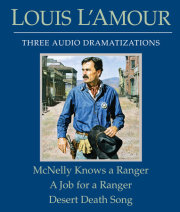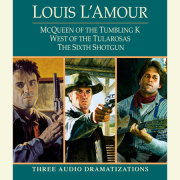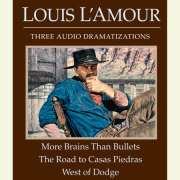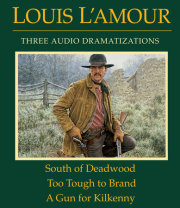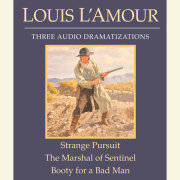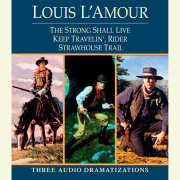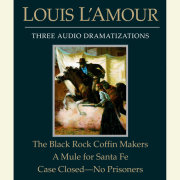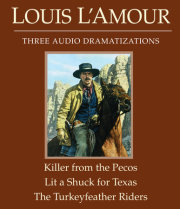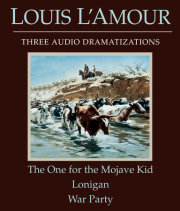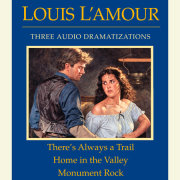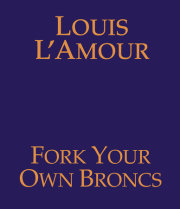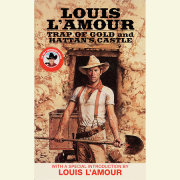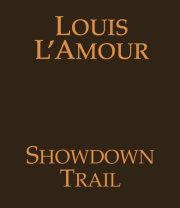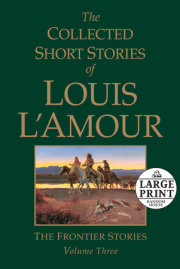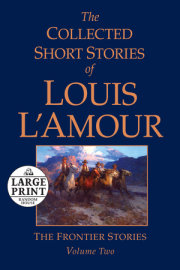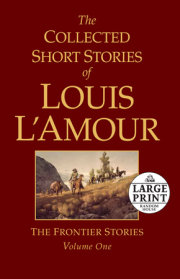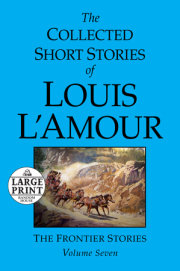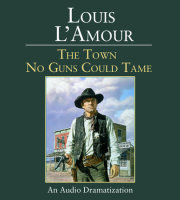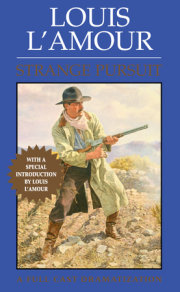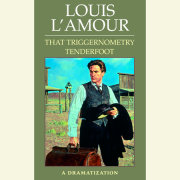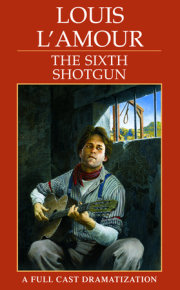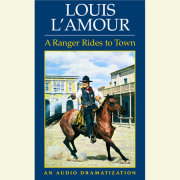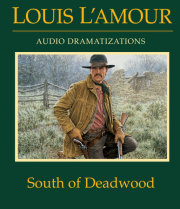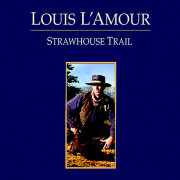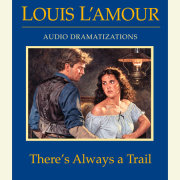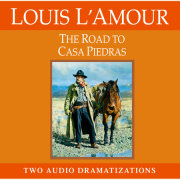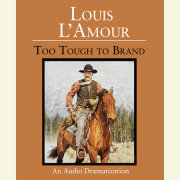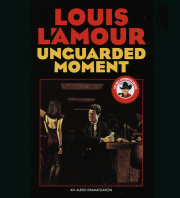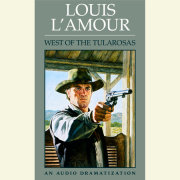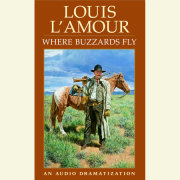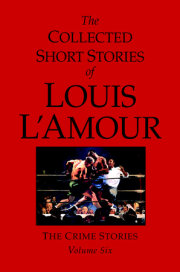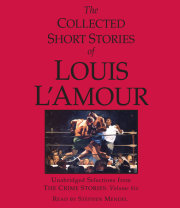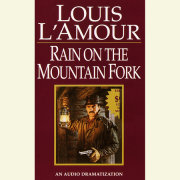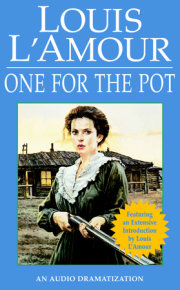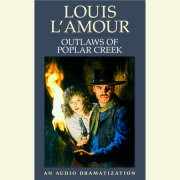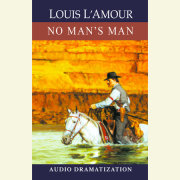Chapter One
MY NAME IS Ronan Chantry, and I am alone upon this land. I have long since crossed the Mississippi. No other rides with me, and the plains lie vast about. My eyes are toward the horizon where the sun sets in gold and crimson, an enormous sun like none my eyes have seen in the thirty years that have been mine.
What I loved is gone. What I lived for, vanished. I ride westward into an unknown land, toward what destiny I know not. It has ever been our way, we Chantrys, to turn westward when faced with grief and desolation.
I ride to lose myself, but can a man ever lose that which is in him? That which is blood and bone to him? That which has been his life?
Men have told me that I am a fool, that I ride only to my death, but if it is to be, then let it be.
My wife, my dearly beloved, is dead. My son, who was to grow tall and sire yet another generation of our family, is also gone, done to death by the flames from which he tried to rescue his mother.
Within me is emptiness; the studies to which I had given my life, abandoned.
I have a good horse, a small pack, an excellent knife, and I have the Ferguson rifle. That rifle, my constant companion since childhood, is all that remains of my past, that and a few precious books to stimulate my thoughts until . . . ?
The rifle was given to me when I was a small boy, presented by the man who simplified the loading mechanism and put into action the most efficient weapon of the century.
Major Patrick Ferguson demonstrated the weapon at Woolwich in June 1776. Four years later, he was killed at the Battle of King's Mountain, North Carolina.
The rifle was given to me only a few weeks before his death, a truly marvelous weapon made and engraved by his own hand. It was one of the first to be loaded at the breech, and could be loaded and fired six times to the minute. In the almost twenty-five years since it came into my hands, I have seen no rifle to compare.
Ours was a poor cabin, and I stood by the gate holding the heavy musket with which I had barked a squirrel, watching a red-coated officer riding up the path from the road.
He looked at me sharply, then at my musket. "Lad, I am fair done in. Could I be having a drink from your well?"
He had a good face, a strong face. "Sir," I said, "you men of England have been my enemies, but I will refuse no man a drink. Will you come in, then?"
He glanced toward the house, wary of a trap. I had no idea of it then, but he was a much hated man, and a man known for his harsh opinions of the colonists.
"There's nought to fear," I said, and there was scorn in my tone. "My ma is ill within, and I must be about fixing her supper." I held up the squirrel, and not without pride.
He glanced at it, then at me. Riding through the open gate to the well, he dismounted to accept the water-filled gourd dipper from my hand. "Thanks, lad." He drank the cold water from the dipper, then refilled it to drink again. "There's no finer drink than this, lad. Hear it from a thirsty man."
He noticed the puzzled expression in my eyes as I looked at his horse. It was a fine animal, but it was his weapons that puzzled me. He wore a saber, and there were two horse pistols in scabbards, which was not unexpected, but he also carried two rifles, one of them carefully wrapped in an oiled cloth.
"What is it, lad?"
"Two rifles?" I said.
He chuckled, but his eyes were on my ancient musket. "If you can bark a squirrel with that," he said, "you must be an uncommonly good shot."
"I daren't miss," I admitted honestly. "When our powder and shot are gone, we must live on greens."
He finished his water, then led his horse to the trough. "May I pay my respects to your mother, lad? If you say no, I shall not intrude."
"She would enjoy it, sir. We have few visitors here, and my mother pines for them. Until she came here, she lived always among people."
My mother was a woman of rare beauty. It took me years and the viewing of many women before I really grasped how truly rare. She was pale now, and thin, lying in the old, high bed, but her hair was done on this day as upon every day of her life. She was ever groomed and neat, and much to my disgust, required that I be the same. The habit was well formed, and is with me still.
The major stepped into our cabin, removed his hat, and bowed. "I am Major Ferguson, ma'am, of His Majesty's Second Battalion, Light Infantry Highlanders. Your son was kind enough to provide me with a drink, and I wished to pay my respects."
"Will you be seated, major? I'm afraid we have little to offer, but if you would join me in a cup of tea?"
"I would be honored, ma'am. Honored, indeed. It is little we see of the ladies these days. Times are hard for a soldier, ma'am."
"And I would they were harder, major." Even as she said it, she smiled, taking the sting from the words. "You come unbidden to our country as you came unbidden to my other country."
"Your other country, ma'am?"
"I was born in Ireland, major, and grew up there. I came over the sea to marry my husband, whose family was known to ours."
"I am a Scotsman. Many of us, ma'am, did not approve of the manner in which affairs were handled in Ireland. We do not make policy. That is the king's business."
"And a poor business he makes of it. But here, now! This is not fit conversation for a guest in my house. Ronan, would you pour tea for us, please?"
My mother's hair was red gold, and the silken bed jacket she wore had come from France, in a better day than this.
"If you will permit, ma'am"-the major accepted his tea-"I had not expected to find a gentlewoman in such a place. Not a woman of such obvious-"
"Breeding, major? There is no latitude or longitude for breeding. We who migrated from Ireland left much behind, often including the O or the Mac that preceded our names, but we did not leave our pride, nor I hope, our good manners."
She smoothed the rough blanket with her hands as though it were satin or whatever she'd known in her younger years. "You travel far, major?"
"To join my command. It is twenty miles, I believe." As if reminded, he got to his feet. "I should prefer to remain, but the ride is long." He hesitated, and then said, "We shall not trouble your land much longer, ma'am. You have resisted us strongly, and at home there's a distaste for it."
"As well there might be," she said quickly, but smiling. "If you pass this way again, will you stop?" She smiled impudently. "The good Lord commands us to forgive our enemies, major, and I forgive you."
"Of course." He glanced at me. "The boy's father? Will he soon be home?"
"He was killed in the war, major."
"If there is anything I can do?"
"No, major. My son does very well. He is a skillful hunter and we shall do splendidly." She extended a slender hand. "Do stop by, major. You will be most welcome."
He took her hand, bowing gracefully, brushing her fingertips with his lips. "It was my pleasure," he said, stepping back, then another step, and turning he went out the door, putting on his hat as he did so.
There was a moment when he kissed her hand that I could only stare, for I believed such things happened only in palaces or among great ladies and kings.
"See him to the gate, Ronan. He is a fine gentleman, and conducts himself as one."
Major Ferguson had gathered his reins and was stepping into the saddle when I came to open the gate. "Your mother is a great lady, lad, a great lady. She should not be living here, in this manner."
From his saddle he took the wrapped rifle, unwrapping it slowly. It was utterly new, unused, silver mounted, and engraved. I gasped.
"Handsome, is it not? I made it myself, for myself." He showed me how it was loaded for I had not seen a breechloader before, nor the mechanism he had invented, for he told me that as he showed me the rifle. "Lad, I have a notion I shall not have long to use it, and there's no telling into whose hands it might fall. A fine lad such as you, who appreciates a good weapon and must provide for his mother . . . well, lad, you need a rifle, not a musket."
I could scarcely whisper. "It . . . it's for me?"
"It is." He put it into my hands.
"Sir"-I held it reverently as a father holds his firstborn child-"I cannot accept it. My mother would not permit it."
"Take it, lad. I shall be gone and there will be no way to return it." From his saddlebags he took a bag of shot and another of powder. "Do you take these too. You surely need them more than I, and before many hours are past, I shall be where there is little else.
"Care for it, son, and it will care for you. I ask only one thing. Keep it always, and never use it against the king."
When he had disappeared around the bend, I walked back to the cabin. When I showed it to Mother, she reproved me gently. "You should never accept a gift unless you can return one of equal value, but when a gift is given, it should be accepted with grace."
She leaned back on her pillow, happier than I had seen her in many weeks. We had few visitors, most of them country people. Good, honest folk they were, but with few social graces, and none of them from the cities beyond the sea.
A few weeks later, we heard of the Battle of King's Mountain, and of the death of Major Ferguson.
We heard much of him later, for he had admirers on both sides of the line. He came of a distinguished Scottish family, was only thirty-six when killed, and had been in the service for twenty-one years.
The Ferguson rifle, which might have won the war in a matter of months, had been taken from his command and put into storage by General Howe after Ferguson had been wounded at Brandywine.
The rifle he left with us helped us through those bad times. Its accuracy was scarcely to be believed, and I became skilled in its use, acquiring speed in reloading. Each time I used it, I blessed the major.
When spring came at last, Mother received a small legacy from a distant relative in Ireland and we moved to the vicinity of Boston and I took the Ferguson rifle along.
The woods lay not far from our home, and often I hunted there. The education I received and enriched by my own reading was an excellent one, and for a year I read law, but a meeting with Timothy Dwight convinced me I should become an educator and a writer of history. Yet now I rode westward into a wild land where the only education needed was that the land could provide.
The sun was gone, although light remained. With darkness near, I still had no camp, and the bald plains promised nothing.
Suddenly, as if born of a wish, there appeared a fold in the low hills. A grassy slope dropped away to a cluster of trees, dark now with evening, and I thought I detected the sheen of water.
Many were the warnings I had received. Water holes were few, used by all, and at any such place death might await. I had not hunted through my boyhood years for nothing, nor had scholarship robbed me of my senses. My nostrils caught the scent of woodsmoke, and I drew rein to listen.
At first I heard nothing, then the faint sound of horses cropping grass, and a crackle as from a fire. Standing in my stirrups, I peered through the leaves, but could see only the shine of light reflected from the seat of a saddle.
It was unlikely a saddle would be used by an Indian, but there were many dangerous men on the prairie, not all of them Indians by any means.
Rifle in hand, I walked my horse forward, calling out, as was the custom. "Hallooo, the camp!"
"Come in with your hands empty!" The voice was matter-of-fact. "Or take a bullet through the brisket."
I drew up. "When I come in, gentlemen, it will be with my rifle in my hands, and if you want to start shooting, just open the ball!"
Somebody chuckled, and then said, "All right, all right! Come on in!"
Several men sat about a fire, and two of them had rifles in their hands. All wore buckskins; all had the appearance of frontiersmen. My dress alone would add a discordant note, for I wore a brass-buttoned blue coat, gray pantaloons with straps under the arches of my Hessian boots, and a starched white cravat. My hat was of the English round variety such as was worn by the young gentleman of fashion. Yet their eyes were on my rifle.
The Ferguson I carried was but thirty inches long; their own rifles looked to be forty-four inches at least.
" 'Light, stranger. Looks like you've come a fur piece."
"That I have." Rifle in hand I dismounted, keeping my horse between them and me.
One of the men chuckled. "Now that goes right with me. I like a careful man."
Tying my horse, I walked around him. "Possibly I am less careful than you suspect. My friends told me I was foolish to come out here alone."
"You're alone?" Startled, they stared at me. "Now that's hard to believe. You're four days' ride from a settlement, mister."
"Three . . . on this horse. You're the first living things I've seen, other than birds and insects."
My palm slapped the rifle. "Anyway, as long as I have this, I'm not quite alone."
The first man to speak indicated the rifle. "Don't know's I ever seen the like. Mind if I look?"
It was my turn to chuckle. "Gentlemen, if I allowed a chance acquaintance to take my gun from my hand, I'd be a lot greener than I am . . . and I am green."
Moving up to the fire, I held it for them to see. "This is a Ferguson rifle, given me by the inventor when I was a lad. It is a remarkably accurate, fast-shooting rifle."
A slim, dark young man seated near the Indian nodded. "I heard tell of them. Heard it said they can shoot six times to the minute."
Copyright © 1985 by Louis L'Amour. All rights reserved. No part of this excerpt may be reproduced or reprinted without permission in writing from the publisher.

